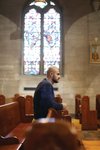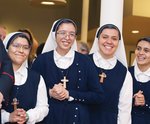

PROVIDENCE — It’s late afternoon on Thursday. The golden rays of the setting sunshine through the stained glass windows of the chapel at Our Lady of Providence seminary, a brick, semicircular structure at the center of the seminary campus.
A seminarian sits among the many seats in the chapel, alternating between praying the Rosary, reading from a prayer book, and staring intently at the Blessed Sacrament exposed upon the altar of the chapel, contemplating the mysteries of the Holy Sacrifice of the Mass, and by extension God’s larger plan of salvation. The smell of food faintly permeates the halls immediately leading up to the chapel as the chef prepares the communal dinner for the seminarians, which gives way to the scent of incense in the chapel coming from the thurible near the altar.
During this time, other seminarians periodically come and go, in between classes, private study, and other duties around the seminary. They are occasionally joined by a layman or two, who join their prayers with those of the seminarians.
This scene is typical of the Our Lady of Providence Seminary. Every Thursday, Eucharistic Adoration is held in the seminary chapel for the purpose of offering our prayers to God for an increase in vocations. Adoration is held for five straight hours, between noon and 5 p.m. Each seminarian takes a turn guarding the Blessed Sacrament for one-hour periods. This weekly event is open to the public.
Events such as these showcase the close connection between the Eucharist and the priestly or religious vocation. “Simply put: No priest, no Eucharist,” said Father Christopher Murphy, the rector of Our Lady of Providence Seminary. “Christ established the priesthood and the Eucharist at the same time on Holy Thursday; they are inextricably linked.”
As parishes across the nation prepare to celebrate National Vocations Awareness Week, from Nov. 6-12, the annual week-long celebration of the Catholic Church in the United States dedicated to promoting vocations to the priesthood, diaconate, and consecrated life, the Eucharist should be at the center of these efforts, Father Murphy insists.
The Eucharist is not only important for priests or religious once they commence their ministry but is also important for many priests and religious in their spiritual and intellectual formation prior to their choice to pursue the priestly or religious life, he said.
Father Murphy referenced a 2022 study of newly ordained priests that showed that 74% of them participated in Eucharistic Adoration on a regular basis prior to their ordination. Commenting on this, Father Murphy stated, “Eucharistic Adoration plays a pivotal role in a man’s discernment of priesthood.”
The rector went on to note that, with an increase in secularism, one of the greatest tools in ensuring morally and spiritually strong priests is to do more to emphasize the Eucharist in priestly formation, noting that the Church “has formed priests in recent times to foster a special Eucharistic devotion.”
“This is not, of course, to suggest that older priests lack this devotion,” Father Murphy noted. “However, as a result of the increased secularization of society, seminary formation needs to pick up some of the slack. She does this by exposing men to the rich traditions of our Catholic faith through prayer and liturgy.”
“It is clear that the Church has made efforts to ensure that her future priests are in love with the Blessed Sacrament,” Father Murphy continued, pointing out how this is often expressed among younger priests in an increased desire for reverence and solemnity in the public worship of the Church and an increased interest in Eucharist-oriented devotional practices. “These young men recognize that Jesus is present [in the Eucharist],” Father Murphy stated.
The fact that the Church has done much to increase its emphasis on the Eucharist in priestly formation is something Father Murphy noticed even in his own priestly formation. “When I started seminary formation, I believe we had Eucharistic Adoration once a week. That increased to every day by the time I completed my studies,” he remembers.
This increased emphasis on the centrality of the Eucharist is reflected in the views of many of the seminarians.
“It’s probably the most important part of it,” said seminarian Alexander Richardson, commenting on the relationship between the Eucharist on the one hand and the priestly and religious life more broadly. “Receiving the Eucharist at Mass is the most important thing we do each day here,” he continued. “Also, Adoration is really important for having that moment and that time with God to just build our relationship with God, because that, for us, is going to be what we are going to be helping other people do with their life. So, that’s something we have to be very solid with in our life.”
Richardson, age 27, is in his first year of seminary training. He is a parishioner of St. Luke’s Parish in Barrington.
Another seminarian, Aidan Blanchette, noted how his desire to become a priest was born out of the influence of good priests he knew personally and a strong spiritual experience he had while praying before the Eucharist in his first time partaking in Eucharistic Adoration.
He went on to note how devotion to the Eucharist is an ongoing part of the priest’s mission, saying, “It is God’s gift to the world. If His Sacrifice on the Cross is a sign of His Love for us, that He would die for us, then the gift of the Eucharist is a sign of His everlasting love.” Blanchette, age 20, is a third-year seminarian and a parishioner of St. John Paul II parish in Pawtucket.
Father Murphy, in describing the centrality of the Eucharist in priestly and religious formation, went on to note that an increased emphasis on the Eucharist in the past several years has anticipated the current Eucharistic Revival Initiative from the USCCB.
The USCCB’s Eucharistic Revival Initiative is a nationwide program aimed at increasing devotion to the Eucharist, as well as clarifying and reaffirming the Church’s traditional view on the Eucharist.
Father Phillip Dufour, the assistant pastor at St. Philip’s parish in Greenville and the coordinator of the Eucharistic Revival Initiative for the Diocese of Providence, noted that an increase in Eucharistic Adoration, or a solidification of Eucharistic devotion in places where it is already strong, has positive spiritual effects for the entire Church, including for vocations.
“In places where devotion to the Eucharist is central in the practice of the Catholic faith, as well as a proper celebration of the Sacred liturgy,” Father Dufour noted. “I believe there is a greater chance for growth in vocations to the priesthood,” he said, adding that there are many responsibilities assigned to the priests, the most important of which are those centered on the Eucharist.
Equally important to carrying out the Church’s mission is the role of the religious. Each religious community has its own charisms, and each one reflects the larger mission of the Church or some aspect thereof in a unique manner.
“God has a very straight mission for the salvation of souls,” said Sister Elizabeth Castro, H.M.S.P., the director of the Office for Religious in the Diocese of Providence. Yet, “God calls whomever He wishes to cooperate with a specific mission within the Church,” she said.
Each religious order emphasizes a certain mission or a certain set of devotions, and it is through its unique emphasis that a specific religious order or community can impact the Church universal. Nonetheless, what all religious orders or communities have in common is their call to live a “life of charity in union with God.”
Despite the manifold ways of living out either the priestly or the religious life, both are defined by their focus on the Eucharist.
“The role of the Eucharist is the core of religious life since the Eucharist is Christ himself,” said Sister Elizabeth.
“We as religious are called to be united to Him daily. Through the Eucharist we remain united to Christ and we have a foretaste of eternal life,” she continued, calling her time in Adoration “my joy, my strength, my light, my motivation to grow in virtue and holiness, to continue my work in serving the Lord and His Church.”
Sister Elizabeth said that what attracted her to religious life was the daily recitation of the Holy Rosary as part of daily Religious Life by offering it for the salvation of the souls, the Blessed Mother Mary was the one that also brought me to Jesus.
“A priest’s vocation and the fruitfulness of his ministry flow from the Lord’s Presence in the Eucharist,” Father Dufour said.
“The weekly Eucharistic Adoration that is held at Our Lady of Providence Seminary is certainly a best kept secret for many, but one that we’d like all to know about,” said Keith Kline, who serves along with his wife Lisa as president of the Rhode Island Chapter of the Serra Club.
The organization, founded in 1935 and named after St. Juneripo Serra, a famous 16th century Spanish Franciscan priest and missionary, is dedicated to promoting vocations to the priesthood.
Kline said the goals of the local chapter are to foster new vocations; to affirm existing vocations; and to grow in holiness.
He connected the role of the Eucharist in the life of the Church with the larger moral crisis facing American society.
“In the absence of God from family and public life, people are left searching for worldly fulfillments because they have nothing else to cling to,” he said.
“The timing of the USCCB Eucharistic Revival initiative is perfect as Catholic priests and the faithful can once again avail themselves to opportunities of sitting before the True Presence of Jesus in the Blessed Sacrament, recognizing his unfailing presence with us,” Kline continued, noting that this will be the cause of “great spiritual fruit” in the lives of both the clergy and laity.
The Providence Serra Club meets on the fourth Monday of every other month at Our Lady of Providence Seminary from 7-8 pm. For more information on joining Serra, contact Keith and Lisa Kline at leeleejack@aol.com, or Father Brian Morris, the director of vocations for the Diocese of Providence, at rev.brian.morris@gmail.com.